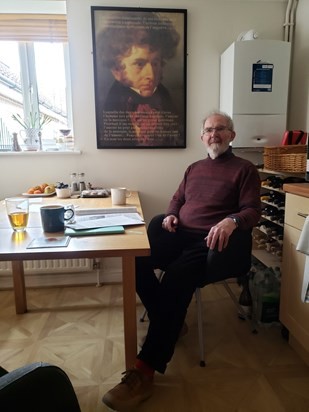
It was with immense sadness that the Trustees learned of the death of Richard Macnutt on 30 April 2024. Richard paid a pivotal role in establishing, running and supporting the New Berlioz Edition Trust and was a Trustee for over 30 years. An obituary by Richard’s son Alex was published in the Guardian. The obituary below is by friend and fellow Trustee Hugh Macdonald and was originally published in the Bulletin of the Berlioz Society. It is reproduced here with permission.
Richard Macnutt was one of the most important figures in the great revival of Berlioz’s fortunes that took off in the wake of Barzun’s biography of 1950. At school he played the oboe and sang, and after service in the army he was articled to a firm of chartered accountants in London, a life which he did not enjoy since his passion for music drew him in a different direction. He and I met in 1958 in the gods at Covent Garden, standing next to each other against the back rail, having seen Les Troyens the week before and being both of us compelled to see it again. I recognised him, with considerable awe, as captain of cricket at our school, Winchester, and he recognised me, with rather less awe, as leader of the school orchestra.
We joined the Berlioz Society, then led by Ron Bernheim and Brian Chenley, attended all its meetings, and eagerly listened to the Munch recordings of Roméo et Juliette and La Damnation de Faust. In 1960 we made a trip to Paris to scoop up whatever Berlioziana we could find. We had little money, so while I was buying whatever I could afford, he was buying things that he couldn’t afford, an early glimpse of his brilliant flair as a collector of, and dealer in, antiquarian music, the career to which he then turned by taking over the Hampstead shop of Leonard Hyman. In due course this was renamed Richard Macnutt Ltd, and he soon became known in the international sphere as a leading expert.
In 1961 we went to the Edinburgh Festival and spent some time with the Hopkinson Collection at the National Library of Scotland. Cecil Hopkinson, as a bibliographer and dealer, was a generous mentor for Richard, and his Berlioz Bibliography, published in 1951 and later republished by Richard himself, guided him in his collection of early editions of Berlioz scores and books, a collection that eventually far surpassed Hopkinson’s, especially in autograph documents. It is now a crucial element of the Berlioz holdings at the Bibliothèque de France in Paris.
At an early stage he and I conceived a plan to publish full scores of Benvenuto Cellini and Les Troyens, since these works were notably missing from the Breitkopf edition of Berlioz’s works. It was not clear how this was to be done, but the plan by Russell Brown, at the Royal College of Dramatic Art, to form a committee to organise the celebration of the coming Berlioz centenary in 1969 led to the better idea of a new complete edition of Berlioz’s works to replace, rather than just complement, the Breitkopf series.
Richard was absolutely central to this ambitious project. He threw himself into the tasks of finding a publisher, a board or directors, and a source of funds. The chair was Gerald Abraham, the publisher was Oxford University Press, and the money came from the Gulbenkian Foundation. With characteristic modesty Richard never cast himself in any central role but took on the duties of secretary to the Board and steered the New Berlioz Edition (as it was rather plainly called) to a new publisher and, over forty years, a series of new Chairmen. Our first volume appeared in 1967 with a performance of the Symphonie funèbre et triomphale by the Liverpool Philharmonic Orchestra under Charles Groves, and the final volume came out in 2006.
Richard was a devoted member of the Berlioz Society. He was always reluctant to write for the Bulletin, being maddeningly modest about his knowledge and understanding of music. He wrote an article “A Storm over the Royal Hunt” about the misplacing in Choudens scores of the Chasse royale after, rather than before, Act IV of Les Troyens. But he could never be persuaded to publish it, and today I am not sure if it ever appeared anywhere. An important article that he did agree to publish was the definitive exposure of the Berlioz forgeries that appeared on the market in the late 1960s.
Richard was a good friend to many of us in the Society. A visit to his farmhouse and library in Sussex was always a profound pleasure, even though the visitor would have to survive the snooker table and the scourge of Richard’s vicious leg breaks on the lawn.
Hugh Macdonald

